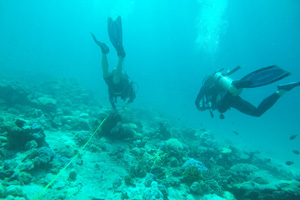
Scientists measuring coral in the Seychelles. Credit: Claudia Kohmann
A ten-year coral research programme involving Essex researchers in the Seychelles has revealed unexpected tolerance in corals growing in lagoons and mangroves to extreme events, such as this year’s “Godzilla” El Niño.
Scientists on the ’Coral and Coastal Ecology of the Seychelles’ partnership project believe this research could have significant implications for direct active conservation management to help build the resilience of coral reefs both in the Seychelles and around the world.
The research reveals that corals in these environments, as found in the Seychelles, have adapted to naturally higher temperatures and more acidic conditions. They therefore are an ideal natural laboratory for studying future conditions under climate change, and the biological traits that install resilience to extreme events in corals.
The research programme is a partnership between the Earthwatch Institute (Europe) and an international collaboration led by the University of Essex including the University of Technology, Sydney, the University of Western Australia, the Seychelles National Park Authority, and the Mitsubishi Corporation.
Data gathered on the Island of Curieuse has tracked the recovery of the coral reefs from an extreme El Niño in 1998, that killed 70-95% of corals in the region, and the impacts of a second extreme El Niño event this year, which bleached 78% of corals. Understanding why some, albeit the minority, were not bleached, may allow for selective breeding to increase the proportion of corals that are tolerant to extreme events.
Scientists on the project have discovered that corals which thrive in these environments have great genetic value to reseed the more vulnerable and sensitive reefs, which were heavily impacted by this year’s bleaching event.
Lead scientist on the project, Professor David Smith, from Essex, said: “Management needs to be based on sound, rigorous and well-tested research. The time has come to use our collective knowledge to implement active management immediately, test management options and disseminate the information as widely as possible to provide the very best chance we can to protect these globally significant ecosystems.”
He added: “Perhaps as much as 10% of the world’s population is dependent in some way on reefs for food or income. However, corals are under increasing threat with the frequency and intensity of extreme events likely to increase in the future. Also, as sea surface temperatures rise, corals reefs are increasingly likely to experience bleaching events, as they are pushed closer and closer to their maximum temperature thresholds above which bleaching can occur.”
Mitsubishi Corporation employees, who have trained as ‘citizen scientists’, have contributed towards the gathering of the project data, thereby creating a unique long-term study of corals in lagoons and mangroves. Early career scientists from the region have also been supported to undertake research into the social impacts of coral degradation.